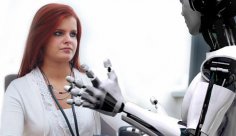
A new computer using human neurons could help treat brain diseases. (Image credit: koto_feja/Getty Images)
A new kind of computer that combines traditional silicon hardware and human neurons is now available for purchase.
CL1, released March 2 by Melbourne startup Cortical Labs, is the “world’s first biological computer deployable using code,” according to the company’s website. The shoebox-sized system could be used to model diseases and develop drugs, the company says.
Inside CL1, a nutrient solution keeps alive human neurons that are growing on a silicon chip. The chip sends electrical impulses to and from the neurons to train them to exhibit desired behavior. Using a similar system, Cortical Labs was able to train DishBrain (CL1's predecessor) to play the video game Pong.
“The perfusion circuit component functions as a life support system for the cells – it includes waste filtration, temperature control, gas mixing, and pumps to keep everything circulating,” Brett Kagan, chief scientific officer at Cortical Labs, told New Atlas.
According to the company, the system consumes only a few watts of power and can keep neurons alive for up to six months.
Scientists at Cortical Labs are continuing to work on creating a system that accurately models the different cell types and functions of the human brain with a minimal number of cells. However, devices like CL1 could help researchers develop treatments for brain-related diseases by studying how the system learns and processes information.
“The vast majority of drugs for neurological and psychiatric diseases that go into clinical trials fail because there are so many nuances to the brain, and those nuances show up when you test them with tools like these,” Kagan added.
Synthetic biological intelligence
Because the technology involves human neurons, some scientists have raised ethical questions about developing a “synthetic biological intelligence” like CL1. Although DishBrain and CL1 are less complex than the human brain, the technology has sparked debate about the nature of consciousness and the potential for future synthetic biological intelligence to experience suffering.
“At this point, I think these are unfounded concerns. I think it would be a missed opportunity not to use a system that has the potential to treat devastating brain diseases,” said Sylvia Velasco, a stem cell researcher at the Murdoch Children’s Research Institute in Australia who was not involved in the development of CL1. “But at the same time, it’s important that we evaluate and anticipate potential concerns that may arise from using these models.”
According to New Atlas, the CL1 devices will retail for around $35,000 per unit and will be available for mass production in late 2025. Each device will require special lab conditions to function properly, so Cortical Labs will also offer remote computing on a cloud platform for users who don't have their own device.

Skyler WareNavigate Social LinksLive Science Contributor
Skyler Ware is a freelance science journalist covering chemistry, biology, paleontology, and earth sciences. She was a 2023 AAAS Mass Media Science and Engineering Fellow at Science News. Her work has also been published
Sourse: www.livescience.com





